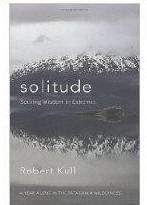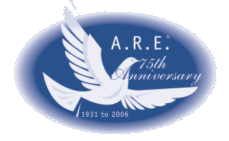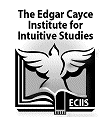| Edited by HENRY REED, Ph.D. |
October 6, 2008
|


The
Value of Solitude*
Robert Kull
Although many cultures have long recognized solitude as an opportunity to look inward, in our culture we sometimes think that spending time alone is unhealthy. Some psychologists even argue that since we’re social beings, meaning is found only through relationship with other people. But we are more profoundly relational than that. To be fully human we need relationships with other people, with the nonhuman world, and with our own inner depths. In solitude we have the opportunity to explore all these domains of relationship. We are also spiritual beings and may feel called into solitude to seek communion with a numinous Presence we can directly experience, but not clearly define.
Solitude offers an opportunity to explore the sense of alienation many of us live with and to realize that being alone is not the same as feeling isolated or lonely. I’ve been exploring solitude — sometimes during months alone in the wilderness — for forty years, and I’ve learned that the core of my loneliness is not separation from other people, but feeling disconnected from myself. Solitude provides a respite from the demands of social life and creates a space for personal healing. Paradoxically, spending time alone can soften our sense of alienation from others.
Spending time in wilderness solitude is a fascinating adventure. We have carried specialization to such an extreme in the service of efficient productivity that daily life can seem boringly repetitious. Activities we used to enjoy when young are lost to the demands of adulthood. Living alone in the wilderness requires that we learn to do everything required for survival. The satisfaction of such self-reliance is deeply rewarding.
Not everyone agrees, and there has been a long and sometimes acrimonious argument about the value of solitude. Perhaps the most common objection is that withdrawing from social engagement is self-indulgent and irresponsible. But to say a solitary is shirking responsibility is to claim complete understanding of the world. We can never really know what contribution we’re making; we can only be true to our deepest calling and trust that we’re doing what we’re meant to do. I’ve found that my desire to contribute to the lives of others deepens in solitude.
We each have a social identity, a persona held in place by our interactions with other people. In solitude this persona begins to lose solidity and dissolve. The process is sometimes terrifying and there are few easy escapes. Solitude challenges us to face our inner darkness and to discover that we’re not identical to the conception we often have of ourselves.
For me, deep wilderness solitude is profoundly meaningful, but I don’t actually recommend it to others. It can be painful and dangerous. We must be called to it from within, and if we require external encouragement, we’re not yet ready. But I do think many of us can benefit from stepping out of our hectic daily activities to spend time alone. Often when asked how we are, we reply, “Busy.” This seems to refer to an on-going state of stress as well as to constant physical and mental activity. We live with the sense that we don’t have enough time to do what we believe we must do.
We tend to value activity above everything else, but all beings need to rest and recuperate. The widespread occurrence of depression in our culture may be linked to our refusal to allow ourselves quiet time. Feeling the need to be constantly busy can prevent us from turning inward. When we are out of balance, our activity doesn’t arise from a place of stillness and wisdom. Much of our activity is ecologically destructive, and frequently our efforts to fix the problems we have caused only deepen the wounds. If, though, we can relax our demands for material goods, the Earth might be able to heal herself. Perhaps we can find fulfillment in nonmaterial terms and learn that what we seek we already have.
We are sometimes so focused on progress that we don’t experience our lives as they are here and now. Yet the world will always be exactly as it is in each moment — no matter how much time and energy we expend denying this simple fact. If our plans for the future are not grounded in joy in this moment, our lives go unlived.
We frequently don’t perceive ourselves to be biological beings in a living world. Theoretically, we know we depend on the physical systems of Earth, but experientially we are alienated from those systems. We treat the Earth as a stranger we should protect for pragmatic or ethical reasons, but until we begin to actually experience nonhuman creatures as family and the Earth as our home, we are unlikely to make the changes necessary for our survival.
Solitude has the power to catalyze shifts in perception. The felt experience of belonging to the ecosphere is psychologically and spiritually healing and may have profound implications for changing our patterns of behavior. Along with economic and legislative solutions, we need inner transformation. Solitude evokes the spacious wonder of living in a sacred world.
* Based on the book Solitude: Seeking Wisdom in Extremes:A Year Alone in the Patagonia Wilderness © 2008 by Robert Kull. Printed with permission of New World Library, Novato, CA. Bob Kull traveled to a remote island in the Patagonia wilderness with enough supplies to live alone for a year. He sought to explore the effects of deep solitude on the body and mind and to find the answers to the spiritual questions that had plagued him his entire life. You can learn more about his story at http://www.bobkull.org.
To order this book from Amazon.com, click here!
|
|



